- Home
- J. -H. Rosny aîné
The Navigators of Space Page 13
The Navigators of Space Read online
Page 13
One might object that mental suggestion, outside of spiritualist theories, is not strictly localized to deductive mediations, that it lends itself to a direct transmission of language. It seems sufficient to posit that, all our thoughts being in the form of words, or at least accompanied by words, our vocal apparatus vibrates to a greater or lesser degree in accordance with the nature of our meditations, that our vocal apparatus speaks concomitantly every time an idea presents itself to intimate sensation. Now, this microphonic movement of the vocal apparatus is no more revealed to the ear by the air than an excessively delicate current reveals itself to an insufficiently sensitive galvanometer. If it exists however, it can, become perceptible to a hypersensitized organ, just as the most minute variation of current is perceptible in a telephone, and hypnosis incontestably creates exacerbations that justify this hypothesis. Consequently, somnambulistic mental suggestion, in theory, can be explained by a reading of thought as direct as reading by conversation, and the former will be much finer and more reliable than the second if it is true that we speak all our thoughts internally, while we disguise the majority of them when we address ourselves to one another.
To this, Luc replied that cerebral penetration will originate independently of the vocal apparatus and any organ transmitting a “convention” akin to language. Humankind armed with planetary physiology, a double life and the new sense, will create means of communication drawn out in the form of the living fiber, in the functional development of the cell, and no longer in the embryonic hieroglyphs of writing and speech. Thus, he did not believe for a moment that the phenomenon would begin with a human penetration of human beings, but rather with an intimate understanding of inferior organisms.
Studying the mystery of primitive protoplasm, humankind will one day conceive its harmonies not merely scientifically but organically. At will, by magneto-nervous insufflation, man will succeed in decomposing it and recomposing it by means of a sort of intellectual electrolysis. He will be able to transport protozoans over a distance galvanoplastically, molecule by molecule, recombining their molecules around the appropriate poles. Eventually, in his unity, he will be able to see them evolving and living within himself, forming his individuality piece by piece; he will acquire immediate consciousness of the fact that he is a colony of multiple animal colonies, a soul compounded of myriads of synthesized souls. He will thus learn to substitute ontological thought for verbal intermediation, after having passed cerebrally, with the same slowness, through all the phases through which it evolved in climbing the scale of living beings.
Before clearly deciphering the thoughts of his neighbor at a distance, man will read the instinct-notions of radial creatures, inferior vertebrates and then, coming closer and closer, the gentle poetry of almost-fraternal animals, his domestic companions. In the depths of mute organisms, their dreams, their logics, their humble desires, their efforts to understand things, he will discover infinite sources of poetry and philosophy; he will acquire the ability to created new mnemonics within them, faculties of retention and abstraction that will lead some of them gradually to participate in our knowledge.
At the divine chimera of animal society, the dream of delicate souls over the centuries, Luc paused, in the bosom of his hypotheses, as if at an aromatic oasis, in the consoling peace of branches, in an exceedingly long and mysterious semi-dusk, beneath the fluid clouds of mercy and love. Future ages there acquire the penumbral poetry that reminds us of ages past, both being saddened by the same idea of Ephemerality, one symbolizing the death of distant ancestors, the other our own death, lost in the forest of millennia!
When that stage is reached the penetration of humans by humans will finally arrive in its plenitude: the conductivity of thought independent of all language and all convention, such that the ultimate ontological evolution will have been instituted, and such that organic conditions would permit its transmission through space. On that day, humankind will attain the summit of his trajectory. On a planet already half-obscure, where water no longer exists as anything but crystals of snow and ice, where the oceans lie in immutable mineral rest, where forces more subtle have become manifest in the thin air and on the harsh surface, humankind will divine a progress toward new Verities and Beauties, and will resign itself to its decrepitude, sounding its century-hours to the tocsin of Eternity. All its mystical aspiration will expand to comprehend the superior Kingdom that will follow the animal Kingdom.
By means of the marvelous acquisitions of scientific generation, by means of planetary physiology, the new sense and cerebral penetration, humankind will undoubtedly discriminate the slightest magneto-nervous modifications, the organic components of the Kingdom furnished by the stellar expanses, the generative inductions vaguely imitated by organo-electrolytic recompositions, the evolutionary relationships of new beings to old, the polarities analogous to that of the double life…
And Luc, in the ultimate minutes of a winter day, standing on a beautiful and funereal promontory in Holland, recapitulated all these shadows, these chimerical phantoms in which his mystical soul loved to bathe and lose itself. The moment was in harmony with his dreams, the hour of supreme frost, immobile in the vastness of smooth seas.
The Occident was in mourning, with purple and ponderous reefs, in the North, the glint of an aurora borealis was scintillating: a frail magnetic light, a sad, imponderable and profound kiss between the electricities of Earth and Sky. Behind him were plains paled by a snow reminiscent of moonlight, the immobility of crystal lagoons, the silence of high latitudes, the tremulousness of cold asterisms in the firmamentary glaciers; everywhere there was a mineralization and etherization of substances, even on the hesitant breast of the ocean, even in the magical glide of navigation-lights and the enveloping rotation of lighthouse beacons.
Luc imagined that every magnetic pole, like that Northern evening, is emitting a subtle auroral conflagration; that every creature is trembling in an ocean of fluids; that all the phenomena of hypnosis—the subtle nervous transmission, even levitation—are the infancy of a prodigious animal dynamism. As the last light expired, the Darkness crouched down upon the Silence and the aurora borealis rose up among the stars in melodious undulations, it seemed to Luc that he no longer had weight, that he was drifting in the web of lines of force, in the infinite intersection of waves that Life, Electricity and Light weave in every corner of Space; he felt that he was floating in the New Realm, around the obscure Earth, condensed in his own being, dreaming of the patient economy of forms that Eternity and Immensity do not allow to accumulate by Individuation for a second.
Like an Apocalypse, all his chimeras clamored simultaneously in his head; he thought that he could touch the utmost depths of the problem and coerce the indefinable forms with which he loved to nourish his soul; he immobilized himself in meditation like the humble monks of the Thebaid or Benares…
But the momentary display vanished, the breast of the oceans gasped toward the promontory, a heavy and rapid breath passed from wave to wave, the night moved on and lived its contemporary life. Luc found himself powerfully and cruelly attached to the earth, in the flagellation of a north wind, his humanity gripping his chest—and he went slowly back toward the lagoons, aware of the inanity of every one of his mystical aspirations, adoring them with a humble heart and a fervent intelligence.
IV. Dream Interlude
Although Luc deemed all mystical aspiration to be quenched by the promises of Knowledge, all poetry and all ascension toward the Enormous and the Vaporous securable in the infinities of Scientific Hypothesis, it was nevertheless necessary to admit—in more troubled souls—a desire for fixed beliefs and formal promises. The troubling and fascinating enigma posed to the ancient Aryan intellectuality, religious Palingenesis, bogged him down on days when a storm threatened without resolving itself, when earthworms writhed in the troubled soil.
In lucid Europe, on our roads bristling with rails, is there still room for a fomenter of mystical Cataclysm, a Buddha, a Christ
or a Mohammed? Without pyres and gibbets, are not our notions of the Ephemeral and the Unstable—our beautiful dream of matter, speech transmitted over long distances through metal wires, the transportation of Force, Thermodynamics and transformist philosophy, the pages of the book of prehistory open in the bowels of the Earth—unbreakable foundations on which any Prophet would be bound to fracture his skull?
Luc meditated upon Mormonism, the Salvation Army, the Shakers, the Spiritists, the mad Summer of Nihilism, and above all our Revolutionaries, the most avid types of contemporary religious Instinct, more sincere than the residues of Christianity or the cultivators of Entities or scholastic Kabbalists, for an entire summer month, an August saturated with vapors, when, in the warm darkness, the atmosphere sometimes discharged itself in phosphorus gleams.
His nerves chased him in nocturnal hunts in which he circled stone Symbols, Temples or Pantheons. Downpours of large raindrops, interrupted by lightning, were dried up by the passage of an oppressive hot breath that seemed to be the respiration of the clouds; the points of ogives, squared Hellene frontons, a dome perched on high, the chiaroscuro joy of colonnades and interconnected towers, the pale flesh of pillars, gladioles and the rocks of ancient Christians, the silk and metal of sunlight on windows, the slow recompositions of lightning at the summits of edifices, immersed him in the abysms of Folktale and Miracle, and the Element humanized and symbolized therein by the dreams of vanished multitudes.
The element! Four ancient substances, confused and terrible phenomena. If the Bible were to be reborn once more, Anthropomorphism would no longer cling to the breath of the Desert, to the Beyonds of the Cloud, to the Voice of the Thunder, it would no longer admonish Neptune or Behemoth, Mylitta the fecund27 or Siva the transformer.
As in the obscure origins when prehistoric people formulated the first codes of hope and supernatural terror, no religion can be born outside the mysteries of the Element. Multiplied and divided, however, its gross manifestations reduced and analyzed, the Element is only adorable now in its acquired subtlety, in the specifications of Science, in its most tenebrous elements. Only a Prophet armed with modern discovery, endowed with the lucidity indispensable to select the parts “still unexplorable for a long time,” the mysterious fractions of advanced physiology, of vital mechanics, would perhaps be able to build a new Religion, but it would be infinitely more transitory than the religions of the Past.
Luc, his soul smitten with the problem, constructed the Bible involuntarily. His being was possessed by the double frisson of the creator who identifies himself with the game of hypothesis and the poet whose nerves thrill with the joy of communicating intellectually with his fellows. The obscure materials furnished by hypnosis and mental illness, the influences of one being on another, he catalogued in their extreme manifestations, then, amassing them in an introduction to a book, vivifying them with transformist terminology, he gradually arrived at suggestions, dogmatic affirmations, vague laws and rules. There commenced the hieratism, the recitals, lapidary in appearance, indecisive and troubled in reality, like so many mirages in which luminous magic sculpts granites, gems and bronzes.
It was necessary to posit, without miracles, without incarnation and without direct divine confidence, the Being; it was necessary to dress him with will-power, arm him with judgment, electrify him with scientific and vital metaphors. In order not to lapse into simple deism, it was necessary to find a new revelation, a possible link between the Human prophet and the Infinite, the Immutable, the Omnipotent.
The story having commenced, the slow Ascension of an intelligence, Luc proceeded gradually to build a new and near-miraculous apperception—but he nevertheless displayed hyper-hypnotic notions, polarities that were, if not defined, at least suggested in nuances, in developments of savant poetry.
The Prophet, he supposed in advance, would be immune to cerebral fatigue. In contrast with ancient doctrines, he would not submit him to fakirism, nor to ascetic disciplines, to Christan fasting or Buddhist annihilation; he repudiated all emaciation of being for the sake of local faculties. Proceeding towards entire superiority, he made him increase his sensory power as a direct result of intellectual progress; he rejected Trials as illusory, destructive of a part of Being. The Prophet’s harmonious ascension; his vascular and nervous systems followed the evolution of his brain, and it was in complete physical health that he came to live “in the field of action of all the ambient molecular forces” without ceasing to increase his concept of the infinite.
At the stage when—here Luc partially echoed his speculations regarding thought transmission and planetary physiology—the Prophet perceived carnally the intimacies of Substance, when he saw metamorphoses like those of light absorbed by the blackness of smoke, little by little a mental sense, not of the Universe entire but of the greater part of Our Nebula,28 increased, analyzed itself and then synthesized itself within him. Eventually, increasingly with every passing day, he felt that he was an atom in complete communication with the whole, succeeding in reflecting and condensing the essential phenomena of the Whole.
Then, transhumanized, he had within him, not a Voice, but the representation we attribute to an assembly of speaking sensations. For, indeed, in the Prophet’s inner being, by virtue of an effort toward a new cerebral power, his life in the field of action of molecular forces becoming unified, he was becoming a creature listening to a symphony without paying particular attention to any of the instruments contributing to it, although he continued to hear them all…
Revelation originates in that. Profoundly moved, by virtue of the recital and the transformist prolegomena as well as the crepuscular anxiety in which the nerves command the brain, the mystic reader is ready to receive the Precepts. Vibrant with the spirit of modernity, selected from the highest sources, clad in enigma everywhere that they are not essential, their accord with the principles of the Era will cement the Tendency to Belief developed by the preceding chapters. Much simpler, in total, than at the outset of the revelation, they will not require complex Artistry, but will nevertheless necessitate an absolute tangibility, a faculty of infinitely subtle choice between the various moral conclusions drawn by contemporary philosophers. The maxims of the struggle for existence, spiritualized and socialized, will be recombined there with the charitable entities to which they can be reduced in the final analysis; the methods of the Positivist school, its rules of research, will adapt themselves marvelously to the new religion’s laws of Work and Solidarity.
That will be the termination of the Genesis. The Work of Propaganda will now begin. The Bible, printed and widely distributed, will run through the social strata with marvelous rapidity, the number of mystics transformed by the marvelous news being incalculable. And it is here, in consequence of the faculties of the very advanced comprehension and very advanced originality of the brain that will have conceived the Bible, that a series of complimentary conditions, rigorous but not impossible to unite in a single man of the Aryan race, will come into play.
Firstly, the man who has conceived the regenerative Religion will sacrifice himself, not assuming the role of Prophet, but that of propagator of the Bible. He will take every possible measure to establish the belief that the Revelator is dead. He will be endowed with faculties indispensable to the propaganda: oral authority, physical grace and especially—by nature and by virtue of very long and laborious study—unrivaled as a hypnotist. He will not disguise his hypnotic power, nor even his recourse to stimulant materials; he will not employ hypnotism as a miraculous element but as a physical and metaphysical demonstration. Finally, he will not be a Pauper; he must never soil himself, in word or in action, with any of the works of Edification or Organization undertaken by the Faithful. He will have no friends. He will live alone and will only appear on days of propaganda; he will refuse all debate as prejudicial to the dignity of his priesthood, having in any case posited, as a first principle, absolute Tolerance, and that the regenerative Religion is not a dogma of condemnation…
<
br /> For a long time, Luc wandered through the labyrinth of this Dream. When the anemia of October arrived, he pursued it through the morning silences, standing in the bare fields at dawn, having taken refuge in some village of olden times. The frail beauty of browns, the exquisite death of enfeebled plants, the exodus of small creatures in the indefatigable navigation of clouds, abundantly nourished the images and Abstract sensations of his Conception. He experienced the life of the Prophet, the frisson of the faithful, the delightful dread of multitudes; he perceived the astonishment of the human race in the tremulous expectation of a return of Youth, of a new Promise in harmony with the Revelations of Science.
Then, he tired of it. In accordance with the fury of the elements, the gallops of cyclones over hillsides, the supplications of forests, the lacerations of the firmament under the claws of the Equinox, while the splendors of foliage died as the twilight dies in collision with Shadow, his soul felt slightly ashamed and regretful; it returned to the sincere charms of actuality, to pure visions gathered from the rich humus of disinterest, exempt from the sickly vegetation of priesthood.
After the fevers of the Storm, in the final remnants of the Sunlight, as November approached, when the cities of Branch and Twig padded the buds of the future against the frost, transmuting the last rays of sunlight into resistance, and the universe of the infinitely small buried itself in warm cavities, Luc revived the vertiginous hypotheses, the circumnavigations of the archipelagos of Conjecture, until the return, in spring, of the softening of grains, the haste of embryos devouring their starch, projecting their roots into the realm of Darkness and their stems into the heights, of the joys of the petal harvesting its beauty in Light, of the creaking of vegetal blood in the tall trees.

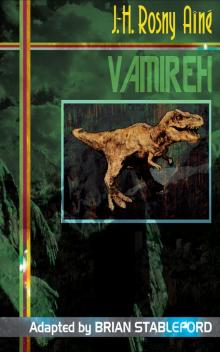 Vamireh
Vamireh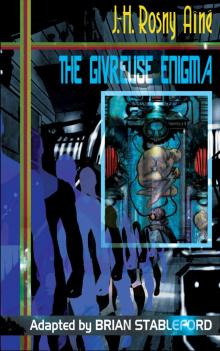 The Givreuse Enigma
The Givreuse Enigma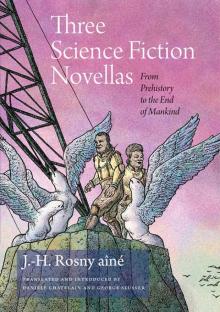 Three Science Fiction Novellas: From Prehistory to the End of Mankind
Three Science Fiction Novellas: From Prehistory to the End of Mankind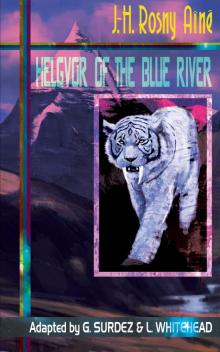 Helgvor of the Blue River
Helgvor of the Blue River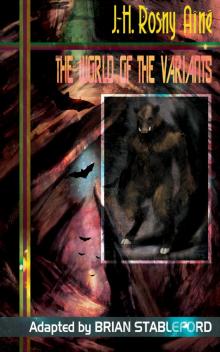 The World of the Variants
The World of the Variants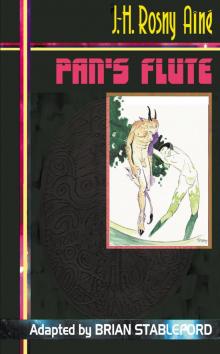 Pan's Flute
Pan's Flute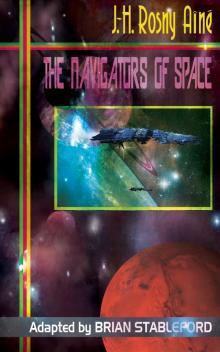 The Navigators of Space
The Navigators of Space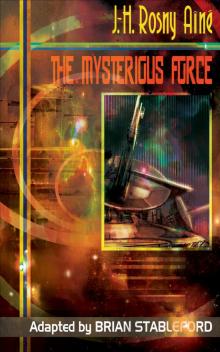 The Mysterious Force
The Mysterious Force